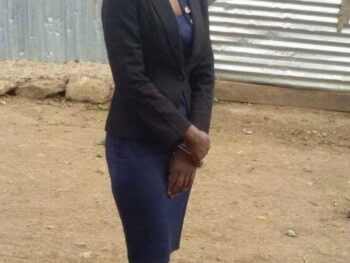THE BRIEFING
August 31, 2020 | 5:04 pm | Send Us Home
#SendUsHome Update for Kenyans in #Lebanon
#SendUsHome Update for Kenyans in #Lebanon: We are thrilled to announce that we're purchasing 33 tickets for Kenyans who are ready to go HOME! If you've been following us, this might seem like the next logical step, while also confusing why we didn't do this a few days ago. Ultimately, the Kenyans fought hard not only for themselves but also for all migrant domestic workers in Lebanon. As we addressed the situation, we were looking at the big picture and failed to treat those heroes with fairness and equity. For that, we are sorry.
The Kenyan women's struggle was not only their struggle but one that resonated with every domestic worker in Lebanon. We're incredibly grateful for these strong women. They were faced with many trials as they took the struggle to the streets, but they stayed strong at every stage. In the end, many of them felt abandoned by This Is Lebanon. For that, we are very regretful. When it is all said and done, we follow our promises by both the letter and the spirit. The spirit of our commitment to pay for the 14 mothers with their 16 children and 3 pregnant women says that even though we didn't have an opportunity to pay for their specific tickets, we said we'd pay for 33 Kenyan tickets. So we will pay for 33 Kenyan tickets! Why did we say otherwise a few days ago? We've put our explanation below.
Kafala in Lebanon is a massive system with over 500,000s workers in Lebanon. An enormous number of these workers are already on the streets, even more want to leave, and every day this becomes true for more and more workers. When we launched our campaign to #SendUsHome, we aimed to evacuate those in most dire need of getting home. Also, we want to most strategically use the funds to repatriate the workers who don't have hope of otherwise getting home in a way that increases the pressure on sending countries to repatriating their workers instead of alleviating it.
It is an incredibly complex task to manage these factors. For instance, we learned that Kenyan Ministry of Labour requires the recruitment agencies to pay an insurance bond every year. This insurance fund is set up so that if there's an emergency situation, the Kenyan Ministry of Labour is supposed to use that insurance money to repatriate their workers (and even pay for lost wages). We heard from a second-hand source that the government is in the process of making this happen. We weren't sure about it but thought it was worth putting pressure on the government instead of alleviating pressure.
Last week, we heard that those 33 women we initially committed to repatriating got their exit passports (with one exception). Still, at the same time, their tickets were purchased, and we were never given an opportunity to buy them. We thought this great news because we felt confident the rest of the Kenyans would be repatriated by existing efforts. We knew of many communities that had less of a spotlight that would need the funds. For instance, did you even know there are women from the Ivory Coast in Lebanon? We know we don't have the ability to launch a French advocacy campaign to bring pressure on the Ivory Coast to repatriate their workers, so they are much more likely to require private funds to get home. However, we do have the ability to form a coalition to help the Kenyans return.
Furthermore, we are uniquely placed in the battle against Kafala in Lebanon. Our focus has always been workers who are trapped with their employers. We are completely reshaping our operations to address the new situation in a new way of getting those workers out. While it seems obvious that those out on the street have it the worst, the very worst is those actively enslaved by Kafala employers. The owners/employers can choose to feed or not feed their workers. They often make them work 100+ hours per week and humiliate and denigrate them in the process. Kafala owners have the choice of whether their workers can work in peace, or they can physically or sexually assault them with complete impunity. It takes an incredible amount of work to negotiate their release, but we see that as one of the direst needs. It was the stories of these workers that we originally posted. A recent one said, "If I don't get any help or my money I am going to kill myself." This is everyday stuff. This Is Lebanon.
However, we missed one important piece. We told the Kenyans that we'd buy 33 tickets for their stranded workers. It doesn't matter what master-plan we come up with. It doesn't matter that we didn't have an opportunity to actually pay for the specific 33 tickets that we first mentioned. We broke trust when we said we were going to allocate those funds to other tickets. We've been in contact with the Kenyan community in Lebanon. They communicated that this is how they felt about our decision. It became clear that it was the wrong decision. Before the master plan for abolishing Kafala, we must first prioritize our relationships with the workers who trust us to fight alongside them in their struggle to survive in this perilous place.
We have over 35 years of fighting Kafala in Lebanon on our team. We created This Is Lebanon at the beginning of 2017. Every day since we've begun, the nights have become shorter and shorter as we stay up to try to respond to the worsening situation. We're fighting to abolish Kafala as hard as we can. We make mistakes along the way, but we learn and grow stronger. If you still feel hesitant to support us. No worries 😉 This is a long-term problem. We've been around a while, but we'll be around a lot longer. Follow our pages. We're accountable to you! Keep asking questions. We only ask one thing of you. Don't look away. This humanitarian disaster of the Kafala system in Lebanon is only getting worse. Keep your eye on Kafala. Keep yelling about it. Keep screaming about it. Join the fight somewhere. Doesn't have to be with us, but you need to be part of the change. Don't look away.
P.S. We just purchased a couple of tickets for Nigerians. We're finally getting together everything to put this plan into action! Stay tuned for more details!
BRIEFINGS
August 12, 2017 | 5:29 pm

Cleaner of LAU Dorms is a Slave
Florence Njoki Wangari arrived in Lebanon from Kenya in June 2014 and left in June 2017. Her first 18 months’ salary were paid but the last 18 months remain unpaid. She repeatedly asked for her full salary, and was told in return that it was ‘in the bank’. Florence was sent back to Kenya for her father’s funeral with the promise of return, so she didn’t even take her clothes with her. When she contacted her employers from Kenya, they blocked her. She is still owed $3,000.
August 21, 2017 | 7:34 pm

Dr. Boutros Bou Younes: Slaveholder, Owes $33,500 to Former Worker
Sonam Moktan, Nepali, came to Lebanon in early 2007 to work for brothers Boutros and Ghassan Bou Younes. Boutros was her employer, but she was handed over directly to his brother, Ghassan. She ended up enslaved for a period of 10 years. In her decade in Lebanon, she is alleged to have faced both physical and sexual abuse. She worked tirelessly, without any holidays or breaks. Her employers did not provide basic items such as clothing and sanitary protection. They told her that her entire family had died in the 2015 earthquake in Nepal. She had almost no contact with them for ten years.
October 31, 2017 | 1:19 pm

Emile Bou Farah and Elias El Murr, Sexual Predators
Below is the anonymised testimony from a domestic worker who came to Lebanon to work for a man named Emile Bou Farah in 2010. Her account details the sexual harassment she says she faced, and the physical abuse she witnessed at the Saliba Agency which employs domestic workers. She says that Emile Bou Farah preyed on her, made unwanted advances and sexually harassed her. Furthermore, she alleges that she worked 16 hour days and was only allowed to eat once a day.

